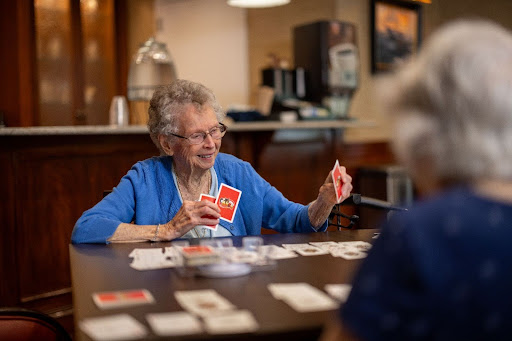
Contact
Tips for Celebrating the Holidays When Your Loved One Has Dementia
By managing expectations and modifying traditions, you can brighten the holidays for people with dementia.
The holidays can be stressful at the best of times. On top of your usual routine, there are end-of-year deadlines and holiday tasks to complete: buying gifts, sending cards, hanging lights, baking cookies and planning holiday meals. For caregivers and people with Alzheimer’s or other types of dementia, the holiday season can be particularly difficult.
It’s common for people with dementia to lack enthusiasm and interest in holidays. They may miss someone who they lost a long time ago, may not recognize the family around them due to memory loss, or may feel that someone is missing. Caregivers may also feel a sense of loss since their loved one may no longer understand or be able to participate in cherished holiday activities. Special traditions, such as decorating the home, lighting candles, or having company over for a meal may become too bothersome or dangerous to continue.
6 Tips to Make the Holidays for People with Dementia Merry and Bright
1. Start a New Tradition
While some traditions may no longer be practical or possible, new traditions can be started. Simple, repetitive tasks are safe and fun to do with your loved one, such as:
- Stringing garlands of popcorn or berries
- Linking up paper chains
- Making wreaths
- Creating photo albums
- Baking cookies (Engage loved ones in ways that match their abilities. Perhaps they can hold a bowl or roll dough. It’s even meaningful if they simply sit at the table while others perform the tasks.)
2. Listen to Holiday Music
Music, especially singing songs together, is a wonderful way to share an experience. Although people with dementia lose the ability to converse, their ability to sing may be preserved in a beautiful way.
3. Keep Expectations in Line with Reality
Do something special but simple, such as going for a walk together. Try to stick with regular schedules as much as possible and plan activities during the time of day when your loved one is most calm and interested. Celebrating earlier in the day can avoid evening confusion if sundowning affects your loved one.
4. Think Twice about Traveling
You should consider the stage of your loved one’s disease, and whether the trip you are considering is a good idea or even possible. Sometimes it’s best for a loved one to stay at home and receive visits of 30 minutes or less from a small number of guests stretched out over a period of days. Keep the number of guests to a minimum; even having two extra people in the room can be too much stimulation. If your loved one is in a memory care facility, bring family members to them.
The safest option this year is to avoid in-person holiday gatherings with people outside of your household. Phone calls and video chats can help you feel connected while social distancing.
5. Give Practical Gifts
Identification bracelets, easy-to-remove clothing and favorite music are dementia-friendly gifts that will be used and appreciated. For caregivers, anything that makes life easier, such as gift cards for takeout food or a promise to help with projects around the home, will spread some cheer. You could also offer to stay with a loved one so the caregiver can attend a family gathering or take time for themselves.
6. Take Care of Yourself
Caregiving is demanding and exhausting. Lack of sleep, increased stress, poor nutrition and depression affects many caregivers. To make the holidays enjoyable, look after your own needs while caring for your loved one. Eat healthy foods, exercise regularly and spend time outside. If you need a helping hand, ask family and friends to run errands and do what they can.
Give Yourself and Your Loved One the Gift of Respite Care
Sometimes you just need a break to rest and recharge your batteries. Or perhaps there are things you simply can’t put off any longer.
Respite care gives you time to relax or take care of things you need to do on your own. It also gives you peace of mind knowing your loved one is safe and getting the level of personalized care and attention you desire.
Whether you need a break or have to go out of town for a short time, we can help. To learn more about memory care at StoneRidge, get in touch. Just knowing what your options are can make the new year something to celebrate.





